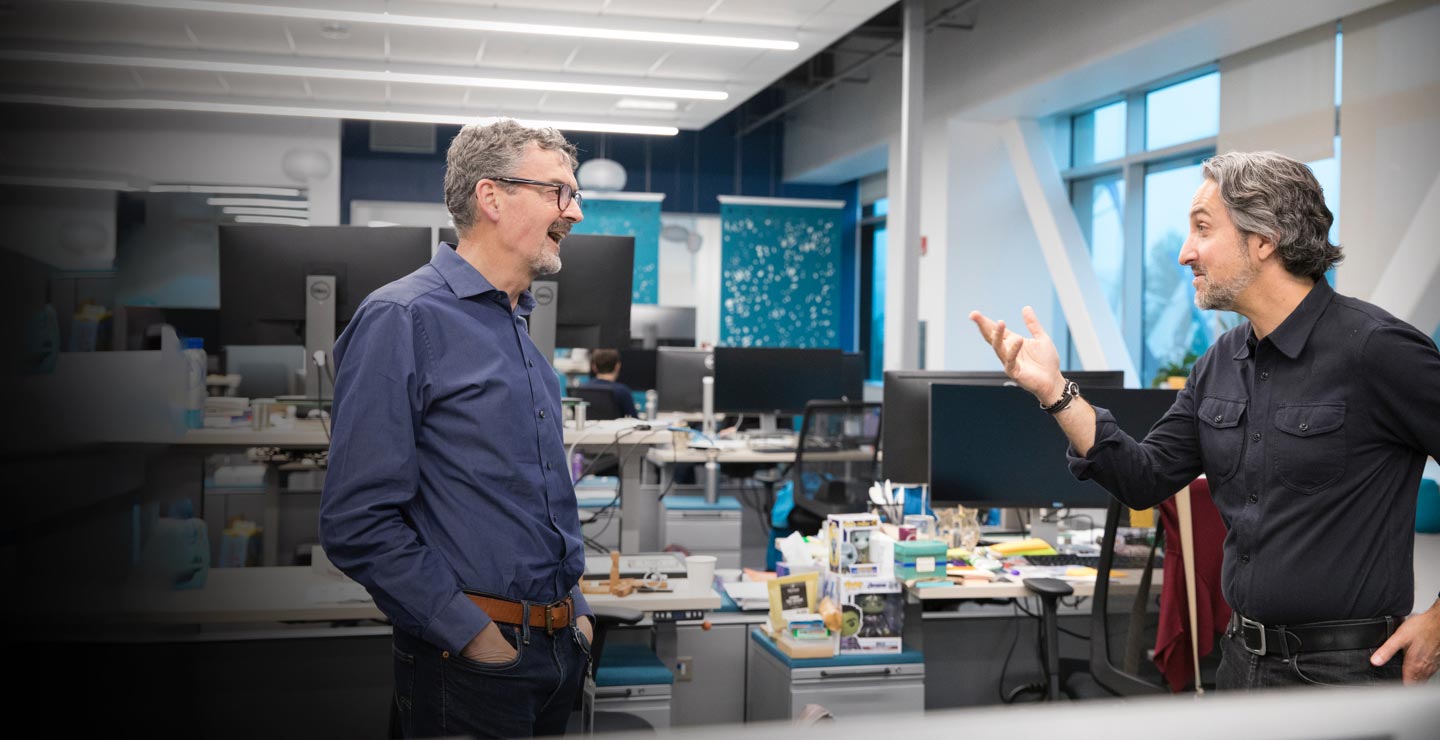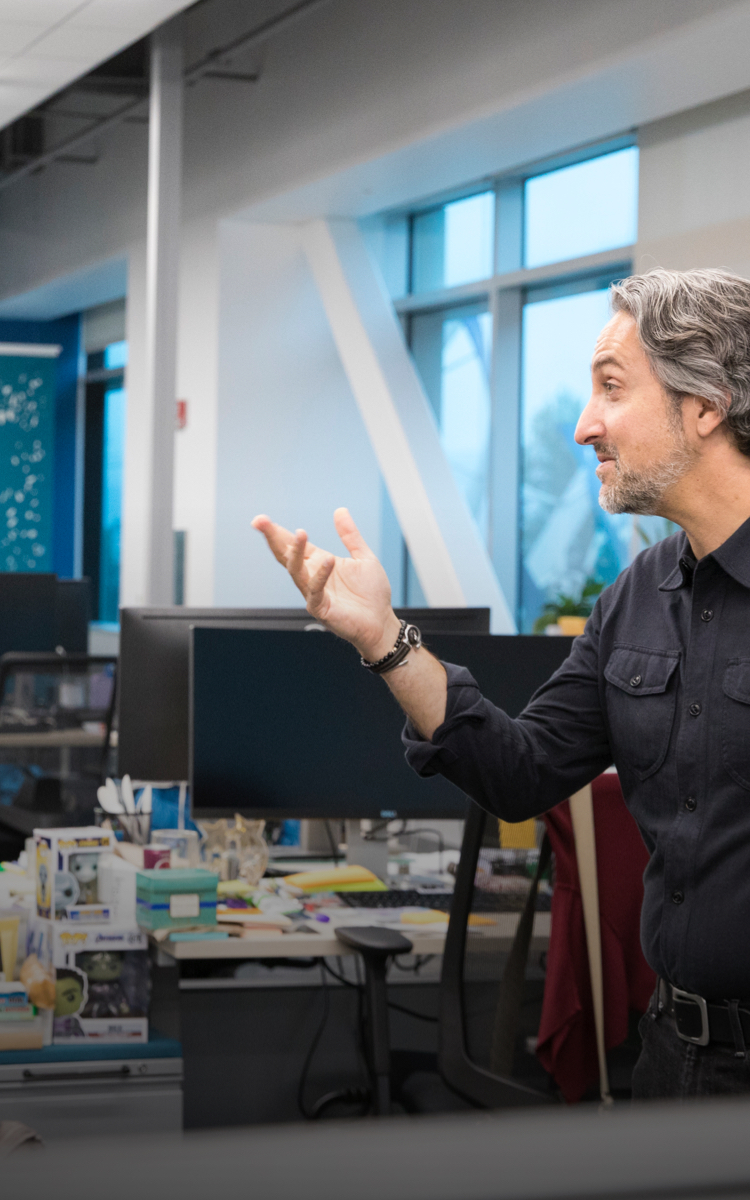Sort by
Sort by
Alex Urrutia

Alex Urrutia
Alex is an immunologist with broad and long-standing experience in basic research, pre-clinical model development and translational research to understand the immune response and its associated inflammation in various pathological contexts (i.e. infectious diseases, cancer).
At insitro, Alex is a Sr. Scientist in the translational assay group helping guide the team with a focus on identifying and validating intermediate phenotypes of disease processes. She is working in close collaboration with the genetic, disease modeling, process engineering and machine learning modules of insitro to accelerate and scale-up the interpretation of the output.
Prior to joining insitro, Alex transitioned from academia to Biopharma in 2017 as a Senior Scientific Researcher at Genentech in the Cancer Immunology department. She implemented translational tools with the aim of accelerating biomarker discovery in the context of immune checkpoint interventions. Additionally, Alex was a biological lead for the development of small/biological molecules in the space of anti-tumor immunity.
Alex was born in Paris, France and received her Ph.D. in Immunology and Physiopathology from the University Pierre et Marie Curie at the Institut Pasteur where she developed a standardized and high-throughput workflow for transcriptomic analysis of a syringe-based whole blood stimulation system to support the population-based integrative approach of the “Milieu Interieur” consortium.
In her free time, Alex enjoys listening to music, dancing, trying out new cuisines and exploring the outside world with her kids.
Atieh Givmanesh

Atieh Givmanesh
Atieh is a scientist with the translation science team where she focuses on designing and developing cellular and molecular assays to find relevant disease phenotypes.
Prior to insitro, she worked at IDEAYA Biosciences and had a role in developing and running high throughput cellular screening assays that helped with the discovery of the company’s first internal synthetic lethality clinical candidate.
Atieh has a background in Biotechnology and received her B.S. from the University of California, Davis followed by a Professional Science Masters degree in the same field from University of San Francisco.
While not working, Atieh enjoys tackling DIY projects, hiking different trails in the bay area, watching soccer tournaments, and spending time with her family and friends.
Eray Watts
VP, High-Throughput Chemistry

Eray Watts
As Vice President of High Throughput Chemistry, Eray leads insitro’s efforts in collection of data correlating molecular structures with biological activities.
Eray is a scientist and inventor with a passion for DNA Encoded Libraries and other invitro evolution technologies. He joined insitro from Haystack Sciences where he was a co-founder, and CEO. His innovations in the DEL field include greatly expanding the synthetic diversity achievable with evolvable DELs, and devising the nDexer selection platform. Prior to Haystack, Eray built and screened DELs at Impossible Foods, and in the lab of Pehr Harbury at Stanford. He did a post-doc at Vanderbilt University in the pharmacology department, working with Anthony Forster, Craig Lindsley, and Borden Lacy. His graduate work in the lab of Chaitan Khosla focused on precursor-directed biosynthesis of novel polyketides, and also on the discovery of novel dihydroisoxazoles targeting TG2 for treatment of Celiac disease.
Eray’s hobbies include science fiction of all kinds, and spending summer Saturdays at the river.
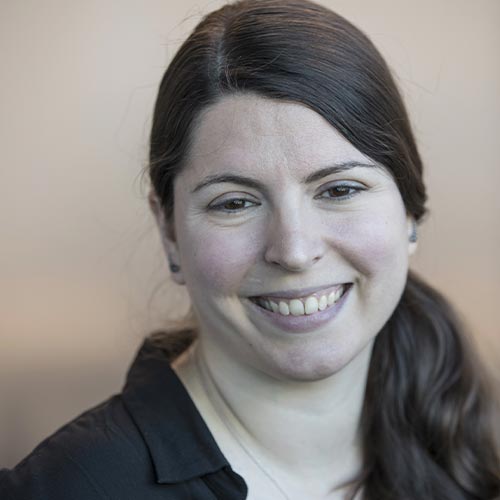
Fiorella Ruggiu


Fiorella Ruggiu
Fio is a cheminformatics scientist in the drug discovery team focusing on supporting the design and generation of massive datasets to enable machine learning driven drug discovery.
She obtained her Ph.D. in theoretical chemistry at the laboratory of cheminformatics in Strasbourg. Afterwards, she joined the Computer-Aided Drug Design team at Novartis Institutes for BioMedical Research as a postdoctoral scholar. Following that, she worked at DiCE Molecules, a DNA-encoded library start-up.
Fio enjoys running and hiking in the beautiful redwood forests and is passionate about arts and crafts.
Jacob Pachter

Jacob Pachter
Jacob is an associate scientist on the high-throughput chemistry team. He received his BS in molecular synthesis from UC San Diego and has experience in medicinal chemistry.
Prior to Insitro he worked at Crinetics Pharmaceuticals synthesizing small molecule drug candidates for rare endocrine diseases.
In his free time Jacob enjoys going to the beach and hiking with his dog, cooking and eating all sorts of things, and watching any professional sport he can find
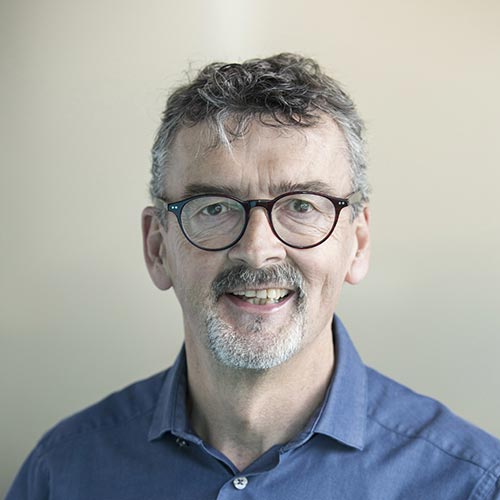
Keith James, SVP of Drug Discovery
SVP of Drug Discovery


Keith James, SVP of Drug Discovery
As Senior Vice-President of Drug Discovery, Keith is responsible for machine learning-enabled drug discovery programs at insitro. Keith and his team are both establishing new drug design capabilities, exploiting the power of machine learning models, and undertaking drug discovery programs on molecular targets derived via the insitro-human (ISH) target discovery platform.
Keith has over three decades of drug discovery experience, building and leading research enterprises ranging from handfuls to hundreds of scientists, tackling programs across a wide range of therapeutic areas, and employing a panoply of therapeutic modalities. During his career, Keith, and the organizations he has led, have delivered over thirty clinical candidates, across fifteen therapeutic areas, many of which have reached Phase 2, and two of which are in the hands of physicians treating patients today – eletriptan (Relpax®) for migraines and maraviroc (Selzentry®) for HIV infections.
Before joining insitro, Keith was President of the Ferring Research Institute in San Diego, engaged in the discovery of peptide therapeutics. Before joining Ferring, Keith had a long career at Pfizer, leading discovery research at three different sites across the US and UK, heading the company’s R&D strategy team, and running a laboratory as a visiting investigator at The Scripps Research Institute.
Keith completed his academic and postdoctoral studies at Imperial College London, The University of Cambridge (Raphael lab), Stanford University (Johnson lab), and Columbia University (Stork lab).
In his free time, Keith enjoys cycling, jogging, reading, writing and mechanical watches.
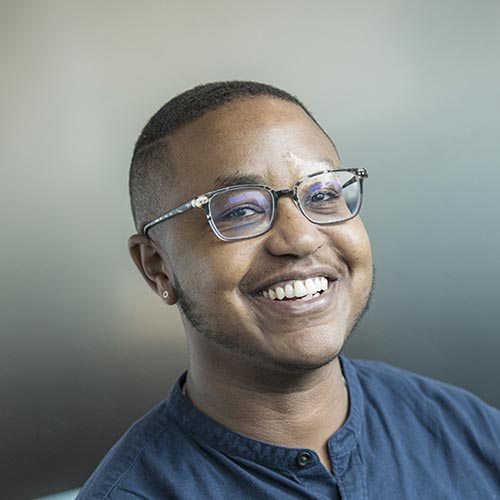
Lorn Kategaya


Lorn Kategaya
Lorn Kategaya is a cell biologist with small molecule drug discovery experience. At insitro, Lorn will develop relevant disease assays and utilize genetic/chemical screens to identify key biological players that modulate disease outcomes.
Lorn has a PhD in pharmacology from the University of Washington, a post-doc from UCSF and industry experience at Genentech and IDEAYA Biosciences.
Away from the bench, Lorn follows politics and enjoys live music, theatrical performances, and french fries.
Selected Publications:
Werner Syndrome Helicase is Required for the Survival of Cancer Cells with Microsatellite Instability
https://www.cell.com/iscience/fulltext/S2589-0042(19)30040-9USP7 small-molecule inhibitors interfere with ubiquitin binding
https://www.nature.com/articles/nature24006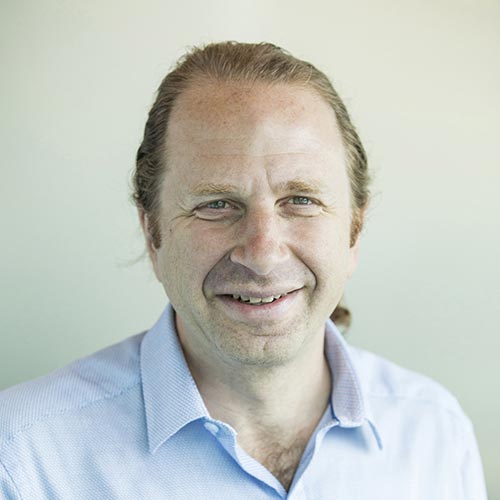
Matthew Albert, SVP of Biology & Translational Genetics
SVP, Biology & Translational Genetics


Matthew Albert, SVP of Biology & Translational Genetics
Matthew Albert is Senior Vice President, Biology & Translational Genetics at insitro.
Prior to joining insitro, Matthew worked as Principal Scientist in the Department of Cancer Immunology at Genentech (2015 – 2019); and served as Professor (2003 – 2015), Founder and Director of the Center for Human Immunology (2007 – 2015) and Director of the Immunology Department at Institut Pasteur, Paris France (2010 – 2015).
Matthew is an immunologist and clinical pathologist, with a long-standing interest in immune regulation and tumor immunity. His research embraces the power of a “human-first” approach to scientific discovery, driven by a commitment to understand how to achieve effective response to cancer immunotherapy, autoimmunity and chronic infection while limiting adverse effects of treatment. As this requires a deep insight into health and disease pathogenesis, he has developed several areas of investigation over the last two decades, which has included a deep commitment to bladder diseases (incl. cancer and UTI); and liver diseases (incl. HCV, HBV, HCC and NASH). He has also been a leader in the Milieu Intérieur Consortium, a 30-team academic / industrial partnership that aims to define the genetic, microbiome and environmental determinants of variable immune responses in healthy persons.
Matthew trained at The Rockefeller University, Cornell University Medical College and did his residency at New York Presbyterian Hospital. He is the author of more than 100 peer-reviewed scientific papers and has made major contributions to the understanding of antigen cross-priming and the impact of post-translational modification of chemokines as determinants of effective tumor immunity. In his spare time, he and his family enjoy cooking together, traveling and exploring the world’s ecology under the sea (marvelling at Ostracod mating practices in the Carribean), in jungles (visits to the Sarawak Biodiversity Centre in Borneo), and in ecology parks (riding dolphins in Tunisia). The have traveled together to over 35 countries, with a strong belief that knowing and engaging with diverse communities and cultures help them be better contributors to the world.
Selected Publications:
Germline genetic polymorphisms influence tumor gene expression and immune cell infiltration. Lim YW, Chen-Harris H, Mayba O, Lianoglou S, Wuster A, Bhangale T, Khan Z, Mariathasan S, Daemen A, Reeder J, Haverty PM, Forrest WF, Brauer M, Mellman I, Albert ML. Proc Natl Acad Sci U S A. 2018 Dec 11;115(50):E11701-E11710. doi: 10.1073/pnas.1804506115. Epub 2018 Nov 21
Natural variation in the parameters of innate immune cells is preferentially driven by genetic factors. Patin E, Hasan M, Bergstedt J, Rouilly V, Libri V, Urrutia A, Alanio C, Scepanovic P, Hammer C, Jönsson F, Beitz B, Quach H, Lim YW, Hunkapiller J, Zepeda M, Green C, Piasecka B, Leloup C, Rogge L, Huetz F, Peguillet I, Lantz O, Fontes M, Di Santo JP, Thomas S, Fellay J, Duffy D, Quintana-Murci L, Albert ML; Milieu Intérieur Consortium. Nat Immunol. 2018 Mar;19(3):302-314. doi: 10.1038/s41590-018-0049-7. Epub 2018 Feb 23
Genetic Adaptation and Neandertal Admixture Shaped the Immune System of Human Populations. Quach H, Rotival M, Pothlichet J, Loh YE, Dannemann M, Zidane N, Laval G, Patin E, Harmant C, Lopez M, Deschamps M, Naffakh N, Duffy D, Coen A, Leroux-Roels G, Clément F, Boland A, Deleuze JF, Kelso J, Albert ML, Quintana-Murci L. Cell. 2016 Oct 20;167(3):643-656.e17. doi: 10.1016/j.cell.2016.09.024
Google scholar
View articlesNikhil Jain

Nikhil Jain
Nikhil is a biochemist with experience in membrane protein expression, purification, structural biology. During his PhD from IIT Kanpur in India, Nikhil worked on biochemical structural and functional aspects of small GTPases.
He has experience in working in diverse biomedical fields including Microbial genetics, structural biology and Biochemistry. As a postdoctoral scientist in Michigan State University and Baylor College of Medicine, Nikhil worked on the structural basis of ribosome assembly using Bacillus subtilis as a model system. As a staff-scientist in Baylor College of Medicine, Nikhil worked on structural and biochemical aspects of membrane protein of Norovirus. Before joining insitro, he was working on biochemistry of Human NADPH Oxidase as a staff-scientist in St. Judes children’s research hospital.
In his free time, Nikhil enjoys playing with his kids and outdoor photography.
Patrick McEnaney

Patrick McEnaney
Patrick is a chemical biologist with experience in DNA encoded library synthesis, selection and assay development.
He obtained his Ph.D. in chemistry from Yale University in the Spiegel lab. His graduate research focused on using chemistry to influence the immune system and led to the development of a fully synthetic antibody mimetic. For his postdoctoral work in the Kodadek lab at Scripps Florida he focused on solid-phase DNA encoded library development, synthesis and selections through fluorescent activated cell sorting. He joined Haystack Sciences in 2018 and has developed and optimized the nDexer selection platform.
Patrick uses most of his spare time to read good science fiction books, watch bad science fiction movies, collect paintings and visit national parks.
Sam Sances

Sam Sances
As a Scientist specializing in neuroscience, Sam is working to couple clinical and genetic data to functional human stem cell models. At the cross-section of high throughput biology and high-fidelity neurological modeling, his focus is on developing scalable assays of cellular disease states involved in neurological indications for therapy development that enable machine learning assisted target discovery.
Prior to insitro, Sam was a Scientist at the Regenerative Medicine Institute at Cedars-Sinai Medical Center in Los Angeles where he led an NIH-funded team to develop next-generation tissue chip models of sporadic ALS and PD. He utilized induced pluripotent stem cells to incorporate blood vessel cells, neurons and microglia into perfuseable micro-engineered 3D environments to model human brain function, blood brain barrier physiology and uncover novel biomarkers of neurodegenerative diseases. These efforts led to a predictive test of early onset sporadic PD in vitro (Nature Medicine) and created new platforms to study opioid addiction and sporadic ALS pathophysiology. Before Cedars, Sam was a CIRM fellow at Sanford Burnham Prebys Medical Discovery Institute where he developed a platform to screen neurogenic compounds using human dopamine neurons in vitro.
Outside of the lab, Sam enjoys life at the ocean shore, travel to remote destinations, mountain trips, aerospace, and hiking with his son.
Selected Publications:
iPSC modeling of young-onset Parkinson’s disease reveals a molecular signature of disease and novel therapeutic candidates
AH Laperle, S Sances, N Yucer, VJ Dardov, VJ Garcia, R Ho, AN Fulton, …
Nature Medicine 26 (2), 289-299
Google scholar
View articlesVictor Galievsky

Victor Galievsky
Victor Galievsky is a spectroscopist with experience in studying kinetic reactions, including biomolecular affinity interactions. At insitro, Victor designs kinetic electrophoresis techniques for the ‘smart’ separation of small molecules and proteins.
Before insitro, Victor worked with Prof. Sergey Krylov (York University, Toronto) and Prof. Janusz Pawliszyn (University of Waterloo, Waterloo) in Canada. His research focused on developing capillary electrophoresis and microfluidic devices to obtain exceptional analyte detectability. Victor coupled a solid-phase microextraction (SPME) sampling with optical detection and created a new in vivo SPME point-of-care analysis approach.
Victor obtained his Ph.D. in laser physics and spectroscopy from the Institute of Physics of the National Academy of Sciences of Belarus (Minsk, Belarus). He also worked as a visiting scientist at the Institute of Physical Chemistry (Warsaw, Poland) and the MPI for Biophysical Chemistry (Göttingen, Germany). Victor’s initial work focused on developing time-resolved spectrometers and their implementation to investigate the specific interactions between porphyrins and nucleic acids, the energy and charge transfer reactions in donor/acceptor molecules, and the photosensitized singlet oxygen generation.
In his free time, Victor enjoys hiking, traveling and photography.


